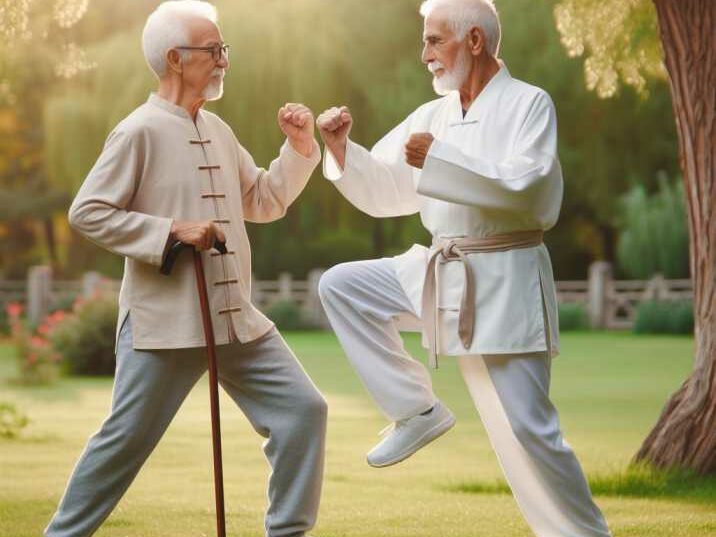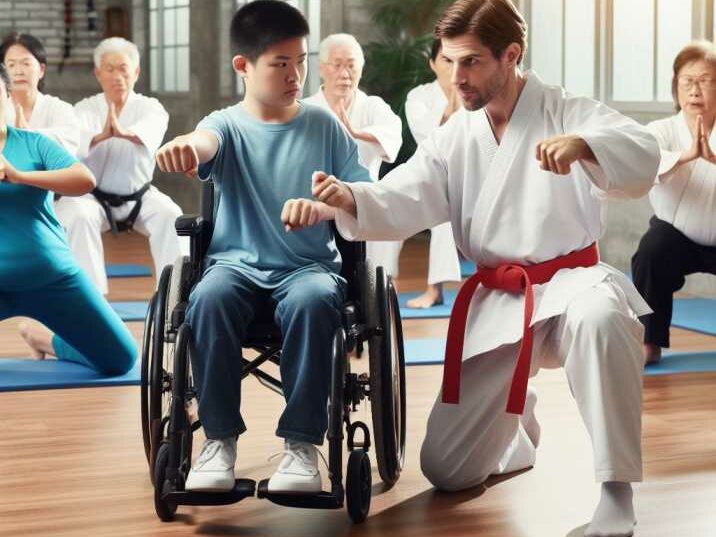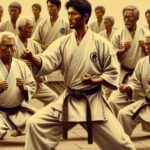Can Kung Fu be Adapted for Individuals with Cognitive Impairments?
Introduction:
Table of Contents
In the realm of martial arts, Kung Fu stands as a beacon of discipline, strength, and harmony. Its rich history and diverse techniques have captivated practitioners for centuries. However, beyond its traditional roots, there’s a question that resonates deeply: Individuals can Adapted Kung Fu for cognitive impairments. Let’s embark on a journey to explore this intriguing possibility.
Understanding Cognitive Impairments:
Before delving into the adaptation of Kung Fu for cognitive impairments, it’s crucial to grasp what cognitive impairments entail. Cognitive impairments encompass a wide spectrum of conditions that affect cognitive functions such as memory, attention, perception, and problem-solving. These conditions can arise from various factors including neurological disorders, brain injuries, developmental disabilities, or aging.

The Essence of Kung Fu:
Kung Fu is not merely a physical practice but a holistic discipline that nurtures the mind, body, and spirit. Rooted in ancient Chinese philosophy, it emphasizes principles like focus, balance, adaptability, and resilience. Through rigorous training, practitioners cultivate discipline, confidence, and self-awareness.
Adapting Kung Fu for Cognitive Impairments:
Adapting Kung Fu for cognitive impairments requires creativity, patience, and a deep understanding of both the art form and the specific needs of the practitioners. Here are some key considerations:
Simplified Techniques:
To accommodate cognitive impairments, techniques can be simplified while retaining the essence of Kung Fu. This may involve breaking down complex movements into smaller, more manageable steps and focusing on fundamental principles such as breathing, posture, and coordination.
Visual and Verbal Cues:
Incorporating visual and verbal cues can enhance understanding and communication for individuals with cognitive impairments. Clear demonstrations, gestures, and verbal instructions can help convey instructions effectively.
Personalized Instruction:
Tailoring instruction to individual abilities and learning styles is paramount. Patient guidance, repetition, and positive reinforcement can foster progress and build confidence.
Structured Environment:
Creating a structured and supportive learning environment is essential for success. Consistent routines, clear expectations, and a sense of community can promote engagement and motivation.

Benefits of Adapted Kung Fu:
The adaptation of Kung Fu for individuals with cognitive impairments offers a multitude of benefits:
Physical Fitness:
Engaging in Kung Fu promotes physical fitness, agility, and coordination, contributing to overall health and well-being.
Enhanced Focus and Concentration:
Through focused practice, individuals can improve attention, concentration, and mental clarity.
Self-Confidence and Empowerment:
Mastering new skills and overcoming challenges fosters a sense of accomplishment, self-confidence, and empowerment.
Stress Reduction:
The practice of Kung Fu provides a constructive outlet for stress relief and emotional regulation.
Social Interaction:
Participating in Kung Fu classes fosters social connections, teamwork, and a sense of belonging.
Table of Information Kung Fu for Cognitive Impairments:
| Adaptation Strategies | Benefits |
|---|---|
| Simplified Techniques | Physical Fitness, Enhanced Focus |
| Visual and Verbal Cues | Self-Confidence, Stress Reduction |
| Personalized Instruction | Social Interaction |
| Structured Environment |
Conclusion:
In conclusion, Kung Fu for Cognitive Impairments. The adaptation of Kung Fu for individuals with cognitive impairments holds immense potential for empowerment, inclusion, and personal growth. By embracing creativity, patience, and empathy, practitioners and instructors can unlock the transformative power of this ancient martial art. Together, let us embark on a journey of exploration, discovery, and possibility.
FAQs:
1. Can individuals with cognitive impairments participate in Kung Fu classes? Yes, with proper adaptations and support, individuals with cognitive impairments can participate in Kung Fu classes and benefit from its practice.
2. How can instructors adapt Kung Fu techniques for individuals with cognitive impairments? Instructors can simplify techniques, provide visual and verbal cues, offer personalized instruction, and create a structured learning environment.
3. What are some of the cognitive benefits of practicing adapted Kung Fu? Practicing adapted Kung Fu can improve focus, concentration, memory, and cognitive flexibility.
4. Is Kung Fu suitable for all types of cognitive impairments? While Kung Fu can be adapted for many individuals with cognitive impairments, the suitability may vary depending on the severity and nature of the impairment. It’s essential to assess each individual’s needs and capabilities.
5. How can adapted Kung Fu classes promote inclusivity and empowerment? Adapted Kung Fu classes provide a supportive and inclusive environment where individuals of all abilities can learn, grow, and thrive. By focusing on abilities rather than limitations, participants are empowered to reach their full potential.


